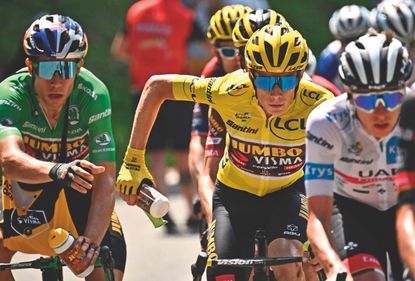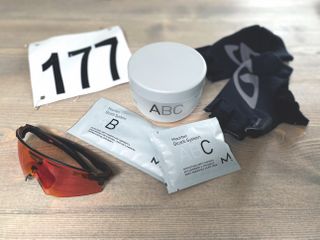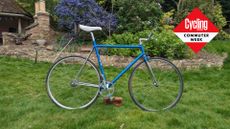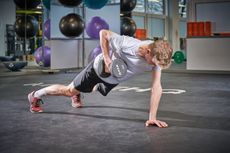Ask the Expert: Does baking soda boost cycling performance - or just cause explosive diarrhoea?
It makes cakes rise, but will it do the same for your sustainable power? We asked Dr Andy Sparks


There are certain nagging questions in cycling that have a tendency to generate conflicting opinions and a confusing array of different views. In this ASK THE EXPERT series from Cycling Weekly’s print edition, we seek to clear up confusion by seeking out the experts best qualified to provide, if not the final word, then at least authoritative advice supported by verified expertise.
Baking soda, or sodium bicarbonate (often abbreviated to bicarb), has been investigated for its potential to improve exercise performance since 1930. The early pioneering work at Harvard University observed improved exercise tolerance when ingested orally. In the 1980s, research focused on cycling performance, leading to bicarb’s widespread use in road and track racing. Given that the performance benefits have been widely known for decades, why is there renewed research and media interest in this supplement?
This may well be due to the Swedish nutrition company Maurten releasing its new “bicarb system” earlier this year. Elite riders and teams such as Jumbo- Visma, Intermarché-Circus- Wanty and Team SD Worx have been using the product, prompting speculation that bicarb could be the not-so-secret ingredient accounting for Jumbo’s spectacular success.
Is it really the miracle supplement that some have presented it as being? Let’s first consider how research on bicarb has progressed since the 1980s. Traditionally, the supplement was only used in short-duration events of one to 12 minutes, i.e. useful for some track events but not for multiple-hour road races. However, recent research suggests that if blood bicarbonate can be elevated for prolonged periods, it might well be performance-enhancing for much longer exercise bouts.
The inconvenient truth about bicarb is its side effects, especially when using the effective dose of 300mg per kilo of body mass consumed either in a drink or capsules. Around one third of people experience gastrointestinal symptoms ranging from mild (belching) to severe (explosive diarrhoea). In fact, bicarb’s reputation precedes it to the extent that many athletes avoid it even in training. The negatives outweigh the positives unless these side effects can be reduced to tolerable levels.
One way to reduce side effects is to take bicarb with carbohydrate (around 1.5g per kilo of body mass). However, this may not be effective in all cases. Another method is to split the doses across several hours before exercise, though this reduces the potency, limiting performance gains.
One of the most effective ways to reduce stomach issues is to “bypass” the stomach by taking bicarb in capsule form, encased in a material resistant to stomach acid. This delivers the bicarb more slowly, meaning less is lost in the stomach. The problem is that this is very expensive and there are no batch tested versions of these capsules on the market.
Get The Leadout Newsletter
The latest race content, interviews, features, reviews and expert buying guides, direct to your inbox!

Another important factor is the timing of ingestion, depending on the ingestion method and individual. Traditionally an ingestion window of 60-90 minutes before exercise was used, but that’s not optimal for everyone.
There may be a way to dodge stomach issues without the need for gastroresistant capsules or individualised timing. Sounds too good to be true? Perhaps not. One method is to take bicarb in split a dose (300mg per kilo of body mass) over several hours: for longer rides, a dose of 90mg/kg 120 minutes before exercise (with a small meal), followed by additional doses of 30mg/kg at 75 and 30 minutes before exercise. Then, for the first three hours of riding, top-ups of 50mg/kg every hour on the bike. This is cheap but tricky without a team car or soigneur to hand out the drinks.
The new Maurten product attempts to deliver the bicarb in a carbohydrate gel without it reacting with the stomach acid, prolonging the uptake. That means it could be useful for long events and intermittent exercise including intense or punchy riding on undulating routes. In our recent study, funded by Maurten, the preliminary data suggests that this product almost completely removes gastrointestinal side effects even in those prone to severe issues.
Conclusion
The evidence suggests that if you consume bicarb while avoiding side effects, it can improve performance in time trials of up to one hour by between 2.1-13.7% compared to a placebo. If blood bicarb can be elevated for prolonged periods, it’s likely to be useful for longer rides too.
Bicarb may also be useful for intense training sessions. A dose of 300mg per kilo of body mass taken with carbohydrate 60- 90 minutes before exercise can be effective (depending on the delivery method).
If you experience stomach issues, reduce the dose and try again. Just remember, this entails a high sodium load – twice the recommended daily intake for each 300mg/kg dose – so don’t take it more than twice a week, and don’t use it if you have an existing kidney problem.
The science: How does bicarb work?
During muscle contractions, hydrogen ions (H+) are produced at a rate related to the force of the contraction. During intense cycling, H+ increase the acidity (decrease pH) of the muscle, which reduces its ability to forcefully contract – contributing to the leg-burning sensation we’re so familiar with.
Energy production occurs optimally only within tightly regulated pH ranges, so for contraction to continue to work efficiently and forcefully, the H+ is transported outside of the muscle into the blood. The H+ entering the blood must be dealt with to prevent the blood from becoming more acidic. Bicarb helps to neutralise these changes in blood acidity, speeding up the process that turns H+ into carbon dioxide and water.
The ingestion of sodium bicarbonate is therefore a method of decreasing the pH of the blood and increasing its bicarbonate concentration. This is most useful during intense exercise, allowing higher power output for longer.
Got a question you'd like us to pose to an expert? Email: david.bradford@futurenet.com
This full version of this article was published in the 18 May 2023 print edition of Cycling Weekly magazine. Subscribe online and get the magazine delivered to your door every week.

Thank you for reading 20 articles this month* Join now for unlimited access
Enjoy your first month for just £1 / $1 / €1
*Read 5 free articles per month without a subscription

Join now for unlimited access
Try first month for just £1 / $1 / €1

Dr Andy Sparks, a reader in Exercise Physiology at Edge Hill University, Lancashire, has published extensively on sports nutrition topics. A keen cyclist, he has also worked as an adviser to elite cycling teams, athletes and sports nutrition companies including Maurten.
-
 Nightmares, niceties and gnarl: 10 years of the Transcontinental Race
Nightmares, niceties and gnarl: 10 years of the Transcontinental RaceThe ultra-distance benchmark that pits riders against a 4,000km self-supported Europe-wide trek reaches double figures
By James Shrubsall Published
-
 Why the best commute will always be aboard my old steel fixie
Why the best commute will always be aboard my old steel fixieCharming, simple, and always a great workout, this is the perfect town bike
By Joe Baker Published
-
 Ask the Expert: Why does my back hurt while cycling?
Ask the Expert: Why does my back hurt while cycling?Physio and bike-fitter Bianca Broadbent reviews the causes of riding-related discomfort and how to treat it
By Bianca Broadbent Published
-
 Ask the expert: Should I do high or low reps in the gym?
Ask the expert: Should I do high or low reps in the gym?Chris Peden quashes a common strength and conditioning misconception
By Chris Peden Published
-
 Ask the expert: What is heart rate variability and does it matter?
Ask the expert: What is heart rate variability and does it matter?Marco Altini highlights the importance of an overlooked marker of fatigue
By Marco Altini Published